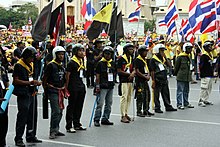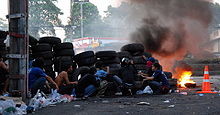Abhisit Vejjajiva's government
The Abhisit Vejjajiva government was the 59th Thai government led by Prime Minister Abhisit Vejjajiva . It was unveiled in December 2008 and replaced by the government of Yingluck Shinawatra in August 2011 due to the 2011 general election .
The previous government under Somchai Wongsawat had to resign because the then ruling party Phak Palang Prachachon (PPP) had been dissolved by the constitutional court . The subsequently installed interim government under Chaovarat Chanweerakul was replaced by the Abhisit Vejjajiva government after about two weeks without holding new elections.
The term of office of Abhisit Vejjajiva's government was marked by fierce and sometimes violent clashes with the opposition, especially with the National United Front of Democracy Against Dictatorship ( UDD for short , German: United National Front for Democracy Against Dictatorship ; popularly known as red shirts ).
history
prehistory
From May 2008, protests began by critics of the People's Alliance for Democracy (PAD), who accused Prime Minister Samak Sundaravej of corruption and called for his resignation. At the end of August 2008, protesters occupied his official residence and several airports. Strikes broke out, followed by violent clashes that resulted in deaths.
The state electoral commission had meanwhile accused the ruling Phak Palang Prachachon (PPP) of fraud in the parliamentary elections in 2007 and filed a ban against them.
On September 9, 2008, the Constitutional Court ruled that Samak should be removed from his post because he was employed as a television cook. On September 17, 2008, his deputy Somchai Wongsawat was elected as the new Prime Minister.
Even after the election, there were further protests by government opponents with new airport occupations, violent incidents and arrests.
On December 2, 2008, the Constitutional Court ordered the dissolution of the ruling party PPP and two of its coalition partners for election fraud. Prime Minister Somchai and other leading members of the PPP were banned from political activity for five years. The government then announced its resignation. As an interim premier , Chaovarat Chanweerakul was installed on December 2nd .
appointment
The Abhisit Vejjajiva government was presented on December 17, 2008. Its composition was published on December 20th, and King Bhumibol Adulyadej swore it in on December 22nd.
Abhisit had not commented on the occupation of the airports, which resulted in a dramatic collapse in the Thai economy, especially in tourism. His government also included politicians such as the new Foreign Minister Kasit Piromya, who had expressly approved of the airport blockade and supported the PAD's actions.
ASEAN summit
At the beginning of April 2009 the ASEAN summit in Pattaya , Thailand had to be canceled after hundreds of red shirt protesters critical of the government stormed the conference venue. Abhisit Vejjajiva then declared a state of emergency. The political unrest spread over the next few days to the capital Bangkok, where two people were killed in street fights with police and soldiers.
Riots in Bangkok 2010
In spring 2010 the protests of the UDD (the so-called “red shirts”) began to flare up again. Security forces took massive action against the demonstrators, resulting in deaths and injuries. In mid-March 2010, around 150,000 red-shirt protesters flocked to pressure the Abhisit government and occupied the Phan Fah Bridge in the old city. On March 17, demonstrators spilled their own blood, which they had previously filled into containers, in front of Prime Minister Abhisit Vejjajiva's official residence to symbolically make a sacrifice for democracy. The centrally located Ratchaprasong intersection (“Ratprasong”) in the Pathum Wan district in the immediate vicinity of various shopping centers and hotels formed the center of the movement for weeks after it was occupied on April 3. In the face of the escalating situation, the government founded the Center for the Resolution of the Emergency Situation (CRES) with an extensive mandate to restore order in the country. It consisted of numerous high-ranking politicians, state officials and the military and was headed by Interior Minister and Deputy Prime Minister Suthep Thaugsuban .
At the beginning of May, Abhisit Vejjajiva presented a plan for early elections in November due to the ongoing protests. The opposition agreed in principle, but in return demanded a fixed timetable for the dissolution of parliament.
In a renewed escalation, one of the leaders of the protest movement, Seh Daeng, was shot dead. After an extensive offensive by the army, in which several people were killed again, the leaders of the government opponents capitulated, whereupon the situation calmed down again.
Floods 2011

In the second half of 2011, Thailand was hit by the largest flood in 50 years. However, due to the general election in July, fighting the flood fell into the responsibility of the successor government to Yingluck Shinawatra.
composition
| function | People) |
|---|---|
| prime minister | Abhisit Vejjajiva |
| Deputy Prime Minister | Suthep Thaugsuban , Korbsak Sabhavasu, Sanan Kachornprasart |
| Minister in the Prime Minister's Office | Satit Wongnongtaey, Virachai Virameteekul |
| Defense Minister | General Prawit Wongsuwan |
| Finance minister | Korn Chatikavanij |
| Deputy Minister of Finance | Pradit Pataraprasit, Pruektichai Damrongrat |
| Foreign minister | Kasit Piromya |
| Minister of Tourism and Sport | Chumpol Silapa-archa |
| Minister for Social Development and Protection of the Population | Witoon Nambutr |
| Minister of Agriculture | Theera Wongsamut |
| Deputy Minister of Agriculture | Chartchai Pukkayaporn |
| Transport Minister | Sophon Saram |
| Deputy Minister of Transport | Kuakul Danchaiwijit, Prajak Kaewklahan |
| Minister for Natural Resources and the Environment | Suwit Khunkitti |
| Minister of Information and Communication | Ranongruk Suwanchawee |
| Energy minister | Wannarat Charnnukul |
| Economics Minister | Pornthiva Nakasai |
| Deputy Minister of Economic Affairs | Alongkorn Pollabutr |
| Interior minister | Chaovarat Chanweerakul |
| Deputy Minister of the Interior | Boonjong Wongtrairat, Thaworn Senneam |
| Minister of Justice | Pirapan Salirathavibhaga |
| Minister of Labor | Phaithoon Kaeothong |
| Minister of Culture | Teera Slukpetch |
| Science Minister | Kalaya Sophonpanich |
| Minister of Education | Jurin Laksanawisit |
| Deputy Minister of Education | Chaiwuti Bannawat, Narisarat Chawaltanpithak |
| Minister of Health | Witthaya Kaewparadai |
| Deputy Minister of Health | Manite nopamornbodi |
| Industry Minister | Charnchai Chairungrueng |
See also
Web links
- Cabinet of Abhisit government announced. The Cabinet of Prime Minister Abhisit Vejjajiva was announced on television Saturday evening after receiving the royal approval. In: The Nation , accessed March 6, 2012 .
Individual evidence
- ^ Head of government as an illegal television cook. In: Neue Zürcher Zeitung , September 9, 2008, accessed on September 13, 2008.
- ↑ Thailand: Somchai new prime minister. ( Memento of December 4, 2008 in the Internet Archive ) In: Kurier , September 17, 2008.
- ↑ Protesters occupy second airport in Bangkok. In: Spiegel Online , October 27, 2008.
- ↑ Thailand's government leaves - to come back. In: Die Welt , December 2, 2008.
- ↑ Kasit under fire as foreign minister Democrats unhappy about his PAD links. In: Khmer News on WordPress.com, December 19, 2008, accessed December 24, 2011.
- ↑ A foreign minister can't just shoot his mouth off. ( Memento of the original from September 16, 2011 in the Internet Archive ) Info: The archive link was inserted automatically and has not yet been checked. Please check the original and archive link according to the instructions and then remove this notice. In: asia one news , December 25, 2008.
- ↑ Chaos at ASEAN meeting in Thailand - summit canceled, state of emergency lifted. ( Memento from April 13, 2009 in the Internet Archive ) In: tagesschau.de , April 11, 2009.
- ↑ Two dead in protests in Bangkok. ( Memento from April 16, 2009 in the Internet Archive ) In: tagesschau.de , April 13, 2009
- ↑ Five dead in clashes in Bangkok. ( Memento from April 14, 2010 in the Internet Archive ) In: Zeit Online , April 10, 2010.
- ^ Abhisit Vejjajiva: The Prime Minister's Special Directive No. 1/2553 - Re: The Establishment of the Center for the Resolution of the Emergency Situation. (pdf) In: Website of the Thai Ministry of Foreign Affairs. April 7, 2010, archived from the original on May 21, 2012 ; Retrieved on March 27, 2012 (English, unofficial translation of the founding directive of the CRES).
- ^ Peaceful agreement in Thailand. In: Die Welt , May 5, 2010.
- ↑ Red Shirts are losing leaders. In: Zeit Online , May 17, 2010, accessed December 24, 2011.
- ↑ Army offensive forces Red Shirts to surrender. In: Spiegel Online , May 19, 2010
- ↑ The battle for Bangkok is not over. In: Die Presse , May 19, 2010.







